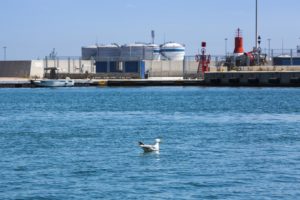
The Valenciaport station has already begun sending data in the test phase to the Air Quality Control Centre of the Regional Ministry of Agriculture, Rural Development, Climate Emergency, and Ecological Transition
The APV is going to install new air quality control cabins as part of the Green C Ports project
València, July 28th, 2020.- The air quality control cabin of the Port Authority of Valencia, located in the Port of Valencia, has been incorporated into the Valencian Network for the Monitoring and Control of Atmospheric Contamination, which depends on the Regional Ministry of Agriculture, Rural Development, Climate Emergency and Ecological Transition. The Environment Department of the Port Authority of Valencia has already carried out the connectivity tests and is adapting the cabin to the technical needs of the Valencian Government for the transmission of data in real-time.
The Valencian Network for the Monitoring and Control of Air Pollution is an automatic air quality control network that allows knowledge of the emission levels in the area where it is established. The Port of Valencia station analyses the air quality in real-time, measuring the concentration of sulphur dioxide (SO2), nitrogen oxides (NO2/NO/NOx), ozone (O3), carbon monoxide (CO), and PM10 and PM2.5 particles. The cabin located in the Valenciaport facilities has already begun to send these data to the Air Quality Control Centre of the Generalitat, which is currently in the testing phase.
The Port Authority of Valencia carries out air quality monitoring through an Air Quality Control Network composed of:
- Air quality control booths, with sensors according to the standard and installed following the recommendations of the Energy, Environmental and Technological Research Centre (CIEMAT)
- Three weather stations
- Two particle collectors
- Computer tools that integrate and manage data in real-time.
In this regard, it should be noted that the APV has put out to tender the supply, installation, and configuration of environmental control equipment within the framework of the GREEN C PORTS Project with a tender budget amounting to 332,700 euros and which will expand the devices for air quality control in the Valenciaport facilities. This initiative is part of the APV’s commitment to sustainable development and the goal of zero emissions by 2030.
A reference in environmental management
The APV has established itself as a European reference in environmental management in the port area. In this sense, it has the most demanding environmental certifications such as the European Port Environmental Review System (PERS), ISO 14001, and the European Environmental Management and Audit Scheme (EMAS III), the most prestigious certification in Europe. Besides, the APV also has the ISO 50001 certification for Energy Management.
As a result of these actions, energy consumption between 2008 and 2016 has been reduced by 25%, and the carbon footprint in these years has fallen by 17%. All the measures implemented by the APV to reduce CO2 emissions are in line with the common objective of the port community of 2030, zero emissions. In this sense, the APV is working to strengthen renewable energies with projects to promote wind energy, the use of Liquid Natural Gas, the electrical substation approved by the Generalitat Valenciana, the commitment to photovoltaic panels to generate solar energy, or the use of hydrogen in the port area.

